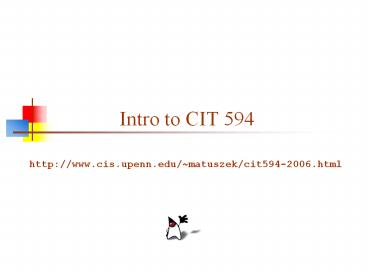Intro to CIT 594 - PowerPoint PPT Presentation
Title:
Intro to CIT 594
Description:
JUnit testing. The Eclipse IDE. You are expected to have good Java programming style ... a book that describes the new features in Java 5 (especially generics) ... – PowerPoint PPT presentation
Number of Views:52
Avg rating:3.0/5.0
Title: Intro to CIT 594
1
Intro to CIT 594
- http//www.cis.upenn.edu/matuszek/cit594-2006.htm
l
2
Prerequisites
- The formal prerequisite is CIT 591
- CIT 591 was primarily a course in Java
- If you did not take CIT 591...
- You must be a reasonably good Java programmer,
including programming applications, applets, and
Swing - You must be familiar with, or prepared to learn
quickly - JUnit testing
- The Eclipse IDE
- You are expected to have good Java programming
style - Other programming languages can not be used as a
substitute for Java
3
What the course is about
- There are four main, interrelated topics in
CIT594 - Recursion
- Data structures
- Algorithms
- Analysis of algorithms
- In addition, we will continue to explore good
programming practices - Good programming style
- Good habits, such as creating test cases
- Use of tools, such as Eclipse and JUnit
- It will also be necessary to cover more Java
4
Required textbook 1
- Data Structures Algorithms in Java, Second
Edition, by Robert Lafore - This book has the clearest and most
understandable explanations of algorithms that I
have ever seen (and Ive seen a lot of Data
Structures textbooks!) - It does not, however, cover some of the essential
math we will need
5
Recommended book 1
- If you dont have a book that describes the new
features in Java 5 (especially generics), you
should get one - Heres my favorite
6
Recommended book 2
- The Elements of Java Style, by Alan Vermeulen
(ed.) - This book describes the style that will be
expected of you
7
Java in this course
- This is a course in algorithms and data
structures, not a second course in Java - But...
- Java 5.0 will be the primary programming language
- We will study Java Collections in detail, as they
are extremely relevant to the course - You will be expected to use Eclipse 3.1M4 or
newer (the current version is 3.1.1) - Eclipse 3.0 does not support Java 5.0
8
Java generics
- C programmers Java generics are similar to C
templates - We will study generics in some detail, but for
now, heres all you need to know about generics - Generics have little or no relevance to the data
structure concepts we will be studying in this
course - Generics completely change the way we code data
structures
9
Java Collections
- Java Collections implement many of the most
important data structures for you - A traditional data structures course would have
you implement these yourself - I dont believe in re-inventing the wheel
- However, you need to know how these data
structures are implemented, for the times when
you need something more than Java gives you
10
Algorithms
- There are literally thousands of published
algorithms - We will cover
- a few algorithms that are related to the data
structures we are studying - a few more algorithms that your instructor
especially likes - Its usually better to find an existing algorithm
than to re-invent it yourself - The Data Structures Algorithms in Java textbook
is an excellent textbook for beginning data
structures and algorithms, but it completely
ignores Javas collections
11
Analysis of algorithms
- Analysis of algorithms is a relatively small part
of this course, but its an important part - Analysis can tell you how fast an algorithm will
run, and how much space it will require - A good algorithm, even if badly coded, can run
circles around a poor algorithm that is carefully
tuned and highly optimized
12
Assignments
- Except as otherwise noted, all assignments
- Are to be done solo (by yourself). As before,
- You may discuss the assignments with other
students - You may help (and get help with) debugging
- You may not give your source code to anyone
- Should be done in Eclipse
- Should include complete JUnit tests, and
- Should include complete javadoc documentation
- Late assignments will lose 5 points per day, and
may not be accepted if more than a week late
13
Grading
- We will have
- Approximately one assignment per week
- One midterm
- One final exam
- Grades will be curved
- We will use Blackboard to turn in assignments
- Grades will be weighted as follows
- 50 assignments
- 20 midterm
- 30 final exam
- If you feel a grading error has been made, you
have one week after grades have been posted to
bring it to our attention
14
Office hours and (no) labs
- I will be more available than last semester
- I will post office hours these are the times
that I will try hard to be in my office and
available - When my door is open, Im probably available
- Please try to keep visits short
- The TA will also have office hours
- We will not have extra help sessions or labs this
semester - We will be doing all or almost all individual
(solo) projects, but there may be some exceptions
15
The End

